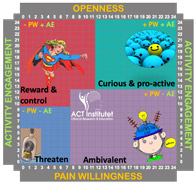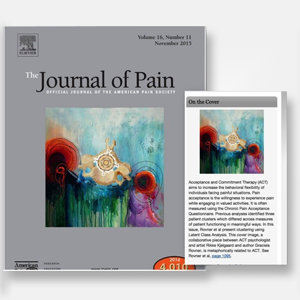Publications
ACT and ACTiveRehabCPAQ-8
Cutoff scores for the 8-item version of the Chronic Pain Acceptance Questionnaire (CPAQ-8) to identify different profiles of pain acceptance patterns, levels of function and behavioral flexibility. Rovner et al 2019
Read about the behavioral plasticity profiles with different patterns of psychological flexibility here

Articles
- ACT in English
- ACT in Swedish
- ACTiveRehab in English
- ACTiveRehab in English | Swedish

Media
- ACT in English
- ACT in Swedish
- ACTive Rehab in English
- ACTive Rehab in English | Swedish

Research: Scientific Publications at International Peer Reviewed Journals
THE JOURNAL OF PAIN, November 2015
ON THE COVER Acceptance and Commitment Therapy (ACT) aims to increase the behavioral flexibility of individuals facing painful situations. Pain acceptance is the willingness to experience pain while engaging in valued activities. It is often measured using the Chronic Pain Acceptance Questionnaire. Previous analyses identified three patient clusters which differed across measures of patient functioning in meaningful ways. In this issue, Rovner et al present clustering using Latent Class Analysis. This cover image, a collaborative piece between ACT psychologist and artist Rikke Kjelgaard and author Graciela Rovner, is metaphorically related to ACT. See Rovner et al, Page 1095.

Read more
Rovner, G.; Vowles, K.; Gerdle, B. & Gillanders, D. (Epub ahead of print) Latent Class Analysis of the Short and LongForm of the Chronic Pain Acceptance Questionnaire- Further Examination of Patient Subgroups. J Pain. 2015 Aug 19. pii: S1526-5900(15)00810-X. doi: 10.1016/j.jpain.2015.07.007. PMID:26297968
Rovner, G.; Årestedt, K.; Gerdle, B.; Börsbo, B. & McCracken, LM, (2014) Psychometric properties of the 8-item Chronic Pain Acceptance Questionnaire (CPAQ – 8) in a Swedish Chronic Pain Cohort. J Rehabil Med 46: 73–80
CPAQ-8 in Swedish, dawnload here!
Bromley Milton, M.; Börsbo, B; Rovner, G.; Lundgren-Nilsson, Å.; Stibrant-Sunnerhagen, K.; Gerdle, B. (2013) Is pain intensity really that important to assess in chronic pain patients? A study based on the Swedish Quality Registry for Pain Rehabilitation (SQRP). PLoS ONE 8(6): e65483. doi:10.1371/journal.pone.0065483
